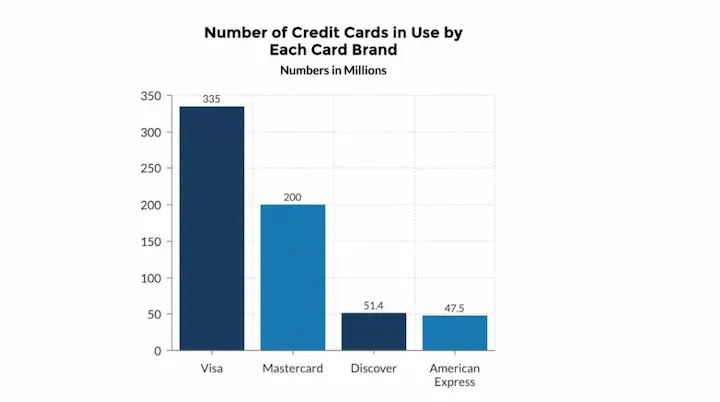Do You Think It is Beneficial to Have Several Credit Cards?
Credit cards can effectively build a credit history and enjoy the perks and rewards if appropriately used. However, is it advisable to carry several credit cards, or should you keep one card in mind? This article will address your questions about credit cards.
What number of cards do I need?
Having at least one credit card to earn convenience and rewards credit card is a bright idea if you aren’t having issues managing your finances and are in a position to pay your credit card bills on time. It is possible to have more than one if you intend to use different credit card rewards or require additional credit lines. Moreover, having multiple credit card applications can help you diversify your credit mix, thus improving your credit profile.
How many cards are enough?
There’s no set number for the number of credit cards you should have. Two cards may be too many for those unable to pay two credit card payments. Maintaining a good credit utilization rate is essential for your credit standing.
Remember that there are better decisions than signing up for multiple cards. Credit card companies may take this action as risky since it could suggest that you’re not competent in managing your money, which may lead to a late payment fee.
They may terminate your account if they suspect any suspicious activity. The application for multiple cards within short periods could affect the credit rating.
Does having more than one credit card open impact my credit report?
A credit score is dependent on the individual’s circumstances. However, the more credit cards you carry, the more difficult it could be to track the cards, make timely payments, and avoid credit score damage. Additionally, having multiple cards could lead to multiple credit inquiries by credit bureaus, negatively impacting your credit file.
Benefits of being a multiple credit card holder with a healthy credit score
The advantages of having various cards and maintaining an excellent credit profile are:
1) Improving your credit utilization score – You can distribute your spending across multiple cards, keeping your credit utilization ratio low. It can have a positive affect on credit scores.
2) Reaping benefits from different cards – Multiple cards with different reward programs and perks enable you to take advantage of various offers and discounts.
3) Better chances of having excellent credit scores – By managing your credit cards responsibly and maintaining low balances, you help boost your overall credit score.
- Get the most rewards programs. Multiple cardholders can earn cash back rewards and bonuses of the highest value on everyday purchases. Some cards can offer monthly payment cash back on gas, while others provide statement credits in return. If you frequently travel, you should consider a card that earns travel credits and makes travel purchases/hotel rewards that could offer you other perks specific to travel, like hotel upgrades or anniversary nights.
- Low credit utilization ratio: Owning multiple credit cards could increase your credit score, helping reduce the percentage of credit use. The credit utilization ratio represents your credit limit using your available credit. The majority of lenders want to see it at 30 percent or less. A credit limit increase can also help keep your utilization ratio low.
- Back-up cards may be very beneficial if your cards get stolen or lost since it can take more than a week or two before receiving an alternate card. It is especially useful when paired with lines of credit to ensure emergency access to funds.
- You can save money by transferring balances. You could save on interest costs by shifting the credit card balance from a high-interest credit card to one with lower rates. A loyalty program can offer even more savings and benefits.
Disadvantages of being a multiple credit card holder
The negatives of having numerous types of credit cards are:
- Difficulty in managing minimum payments and tracking spending across multiple accounts.
- Potential difficulty accessing additional credit products from financial institutions due to already holding multiple cards.
- The possibility of harming your credit scoring models because of applying for multiple cards quickly.
- The increased temptation to carry an extra credit card and overspend leads to a large outstanding balance on multiple cards.
- A lower credit score is possible due to bad credit accumulated from missed or late payments across different cards.
- Greater chance of errors on credit reports from major credit bureaus because of having numerous accounts, negatively impacting credit history.
- Eligibility for better auto loan terms and interest rates may be affected due to a lower credit score from managing several types of credit cards.
- Type of credit card and Annual fees: Beware of having several cards with an annual fee, especially if you need a different type of credit card. The fact that you pay these fees indicates that the cons outweigh the benefits the card offers, such as points or rewards (rewards cards).
- It is more challenging to keep track of your finances and maintain good organizational skills: The more cards you own, the more cards you have, and the more likely you will overlook paying the bill on time or tracking credit limits. Developing better organizational skills and financial habits, like making timely payments, can help in this area.
- Make yourself appear risky to issuers: Making multiple applications to credit cards within a six-month time frame can cause you to appear to be a difficult creditor.
- Easy to spend too much: The more credit lines you open and the higher your credit, the more your spending power increases, potentially leading to poor financial habits.
- Various hard credit checks: Each time you request a credit card, your credit scores are subject to a hard inquiry (or the hard inquire) by the credit card issuer. A variety of hard checks can affect credit rating.
- Consider setting up automatic payments: Utilizing automatic payments can help ensure that you make timely payments on all your credit cards, reducing the risk of late fees and negative impacts on your credit score.
Six tips for managing your credit card debt
Here are six tips for managing many credit cards with multiple credit card accounts:
- Limited time offers: Take advantage of limited-time offers and promotions for certain spending categories. It can help you save money and maximize the benefits of each card.
- Spending categories: Identify the spending categories where each primary card offers the best rewards or cashback rates. For example, one card might offer higher rewards for dining out or traveling, while another might offer better grocery shopping rewards. Use each card for its specific purchase category.
- Types of purchases: Be mindful of the types of purchases that each card rewards the most. Keeping track of daily spending using budgeting tools can help you ensure you use the appropriate card for each purchase.
- Rewards structure: Understand each card’s rewards structure and how to pair additional cards together for maximum benefits. It can help you make informed decisions when choosing which card to use for purchases.
- Monthly balance: Pay off your monthly balance in full for each card to avoid interest charges and maintain a healthy credit score.
- Online purchases: Some cards specifically offer extra rewards or cash back for online purchases. Use these cards when making online purchases to maximize your benefits further.
- Keep track of your monthly and annual fee due dates. Automated payments can assist you in ensuring that you don’t overpay for the monthly installment. It’s also crucial to record the date each month’s payment is due because a late payment could cause more interest. Also, keeping a record of the dates when your payment for the year is due can assist you in tracking when the fee is due.
- Do not open new accounts to improve your score on credit. The key factor is how you use your cards, which is more important than how many you have.
- Be vigilant about your balance from month to month. Do not use credit cards to make monthly purchases of items you cannot pay for, as this can accumulate liability charges and negatively impact your financial stability.
- Be aware of the period of time can affect your credit score while requesting a brand-new credit card. If you have already registered for a new card for a brief period, it’s advisable to wait until you can request a new one. The span of a few days could affect your credit score.
- Do not necessarily close your old credit cards when you request a new one. In many instances, a credit card company also wants to have a spending requirement history of credit. The longer you have old accounts open, the better to improve your score and record, making it a safe choice to keep unused cards.
- Do not let any of your cards go unnoticed. Ensure you use all your cards; every card used at a time will stop them from going into inactivity. If the company closes your card because of inactivity, your credit utilization ratio will increase, affecting your strong credit rating.
The Bottom Line: What is the best way to have several credit cards?
Multiple cardholders are good if you know the obligations to pay, avoid overspending (spending habits), and keep an acceptable credit utilization ratio. Potential benefits include a higher rewards rate, making major purchases easier, and having a mix of premium cards to maximize your Ultimate Rewards. One of the biggest factors in deciding this is balancing these many cards and their perks.
But, if you know you are prone to accumulate large sums of money or are having trouble keeping track of payments, it’s better not to have several credit cards. Additionally, not using the consumers for spending offers, such as those that provide generous cash back, could lead to missing out on the potential benefits that multiple credit cards can offer. In this scenario, weighing the biggest factors before applying for additional cards is important.

Frequently Asked Questions
Is it okay to have multiple credit cards to improve my credit score?
Having multiple cards can help build credit diversity but too many new accounts too quickly may lower scores temporarily. Aim for a moderate number over time.
How does having multiple credit cards affect my credit utilization ratio?
A low combined balance relative to total limits on multiple cards generally yields a lower overall utilization ratio which can boost credit scores.
What are the advantages and disadvantages of having multiple credit cards for building credit?
Advantages include growing available credit and diversifying accounts reported. Disadvantages may include complex debt management and temporary score drops from new accounts.
Will applying for multiple credit cards at once negatively impact my credit score?
Yes, a surge in hard inquiries from multiple credit card applications within a short timeframe can cause an initial score drop before the new accounts benefit your file.
How can I manage multiple credit cards responsibly to maintain a good credit score?
Strategies include keeping low balances relative to limits, avoiding missed payments, and only applying for new accounts periodically to control hard inquiries.

